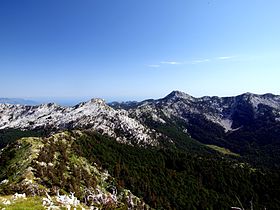Dinarides
| Dinaric Alps | |
|---|---|
| Dinarides | |

Orjen mountain, which spreads between Bosnia and Herzegovina and Montenegro, is the most heavily karstified range of the Dinarides.
|
|
| Highest point | |
| Peak | Maja Jezercë (Albania) |
| Elevation | 2,694 m (8,839 ft) |
| Coordinates | 42°26′30″N 19°48′45″E / 42.44167°N 19.81250°ECoordinates: 42°26′30″N 19°48′45″E / 42.44167°N 19.81250°E |
| Dimensions | |
| Length | 645 km (401 mi) NW-SE |
| Geography | |
| Countries |
List
|
| Borders on | Julian Alps |
| Geology | |
| Age of rock | Mesozoic Era |
| Type of rock | Sedimentary |
The Dinaric Alps or Dinarides is a mountain chain which spans from Italy in the northwest, over Slovenia, Croatia, Bosnia and Herzegovina, Serbia, Montenegro, Albania to Kosovo in the southeast.
They extend for 645 kilometres (401 mi) along the coast of the Adriatic Sea (northwest-southeast), from the Julian Alps in the northwest down to the Šar-Korab massif, where the mountain direction changes to north-south. The highest mountain of the Dinaric Alps is Mount Triglav, a mountain located in Julian Alps in north west Slovenia, standing at 2,863.65 metres (9,395 ft).
The Dinaric Alps are the fifth most rugged and extensively mountainous area of Europe after the Caucasus Mountains, Alps, Pyrenees and Scandinavian Mountains. They are formed largely of Mesozoic and Cenozoic sedimentary rocks of dolomite, limestone, sand and conglomerates formed by seas and lakes that had once covered the area. During the Alpine earth movements that occurred 50–100 million years ago, immense lateral pressures folded and overthrust the rocks in a great arc around the old rigid block of the northeast. The Dinaric Alps were thrown up in more or less parallel ranges, stretching like necklaces from the Julian Alps as far as northern Albania and Kosovo, where the mountainous terrain subsides to make way for the waters of the Drin River and the plains of Kosovo.
...
Wikipedia

